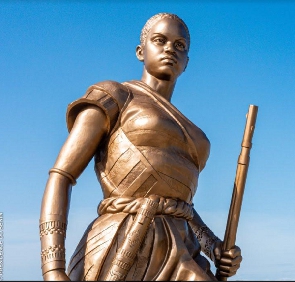The history of Africa is replete with tales of courage, resilience, and valour exhibited by heroines of their various kingdoms, which, for better or worse, formed the history of Africa from ancient times.
The Nubian Queen Amanirenas who fought and defeated the Romans come to mind. Accounts of such individuals, such as Queen Nzinga of the Ndongo and Matamba Kingdoms of Angola, Yaa Asantewaa of the Asante Kingdom in Ghana and Mbuya Nehanda of the Shona Kingdom of Zimbabwe are well known.
However, some, like Mama Yakagbe of the Anlo Kingdom and many other women heroines, are not well known on the global scene.
One remarkable chapter is the saga of the Benin Agojie, also referred to as the Amazons by the whites, who were not queens but ordinary, nameless women in the service of their kings. These fierce warrior women of the Abomey/Dahomey Kingdom, located in the present-day Benin Republic, made their mark in history through their unwavering determination, loyalty, fearlessness, and their triumphs in battles against the Oyo Kingdoms and French colonisers.
Their exploits are now captured in enduring legacy in the form of films and monuments that continue to intrigue and inspire us all today. This article focuses on them in memory and honour of all the ordinary women of the past and
now who are doing their utmost to make Africa great again.
Who were the Benin Agojie (Amazons)?:
The Dahomey Agojie or Amazons were an elite corps of warrior women who served as the royal bodyguards and defenders of the Abomey Kingdom. These women were carefully selected and trained from a young age in the art of war and combat skills. They were known for their exceptional marksmanship with muskets, their proficiency in hand-to-hand combat, and their unwavering dedication to their mission.
Triumphs in wars against the Oyo Kingdoms and French colonisers::
The Agojie earned their reputation as formidable warriors by engaging in numerous battles against other tribes in the then Dahomey and the various Oyo Kingdoms, powerful neighbouring states in modern Nigeria. In these conflicts, they demonstrated their unmatched martial prowess and strategic acumen, often emerging victorious in most battles. Their fearlessness in the face of
adversity earned them the respect of their foes and the admiration of their people. They were true defenders of their kingdom against invaders, as well as in Abomey's own predatory wars.
Their resilience was further tested during the colonial era when French forces sought to exert control over the current Benin Republic. The Agojie fiercely resisted the French colonizers, refusing to yield to colonization and oppression. Their tenacity and bravery in defending their homeland inspired others to join the fight for freedom until they were defeated in the war of 1892 to 1894 due to the superior arms of the French. Abomey became a part of the French Colony of Dahomey in 1894.
The story of the Agojies retold and re-enacted in films:
The legacy of the Agojie is now being brought to the forefront, since Klaus Kinski's Cobra Verde of 1987, in various award-winning films such as Black Panther, Wakanda, and The Woman King, which celebrate their remarkable contributions to history. These films were great hits, starring actors such
as Chadwick Boseman and Michael B. Jordan. They earned high praise for their roles in the 2018 Marvel Film Black Panther. But for many, the real stars were the Dora Milaje, the Special Forces Unit of the fictional Kingdom of Wakanda. In the film 'The Woman King', Viola Davis and Lupita Nyong also depicted the courage of these warrior women and the challenges they faced.
It served as a reminder of their indomitable spirit and their role in shaping the destiny of their people.
Remembrance and commemoration:
In a significant act of remembrance, Benin's President Patrice Talon, erected a giant and imposing statue in honour of all the women warriors of Benin as part of the country's 62nd Independence anniversary in August 2022, ensuring that their legacy would endure for generations to come. This monumental tribute not only recognizes the Agojie's sacrifices but also underscores the importance
of acknowledging the often-overlooked contributions of women in history.
The place where the statue was erected is called "La Place de l'Amazone".
Lessons and legacy:
The stories of the Dahomeyan Agojie, just like Queen Nzinga, Mama Yakagbe, Yaa Asantewaa, and Mbuya Nehanda, remind us of the immense potential and power of women when they are called to defend their communities and fight for justice. These women shattered gender stereotypes and proved that courage knows no gender.
Their legacies teach us the importance of resilience, unity, and unwavering commitment to a just cause. They serve as beacons of hope and inspiration for those facing adversity, and their stories should be included in the annals of history to ensure that their contributions are never forgotten.
Today, the battles and the wars have changed status: they are no longer fighting human enemies and oppressors, but rather fighting, bringing down, and winning the social, cultural, and economic, must be seen at the forefront of these wars
globally, especially in Africa. The modern Amazons must rise from every nook and cranny and be counted in this modern world. They must fight alongside their male counterparts.
These concerted efforts are more than needed in our modern days and times. In a world where gender equality and empowerment are essential, Benin's Agojies represent the gallant women warriors and actors in history and stand as powerful examples of the strength and determination of women. Their stories remind us of the unsung heroines and heroes whose names are not known to the public.
Opinions of Wednesday, 4 October 2023
Columnist: Joel Degue















